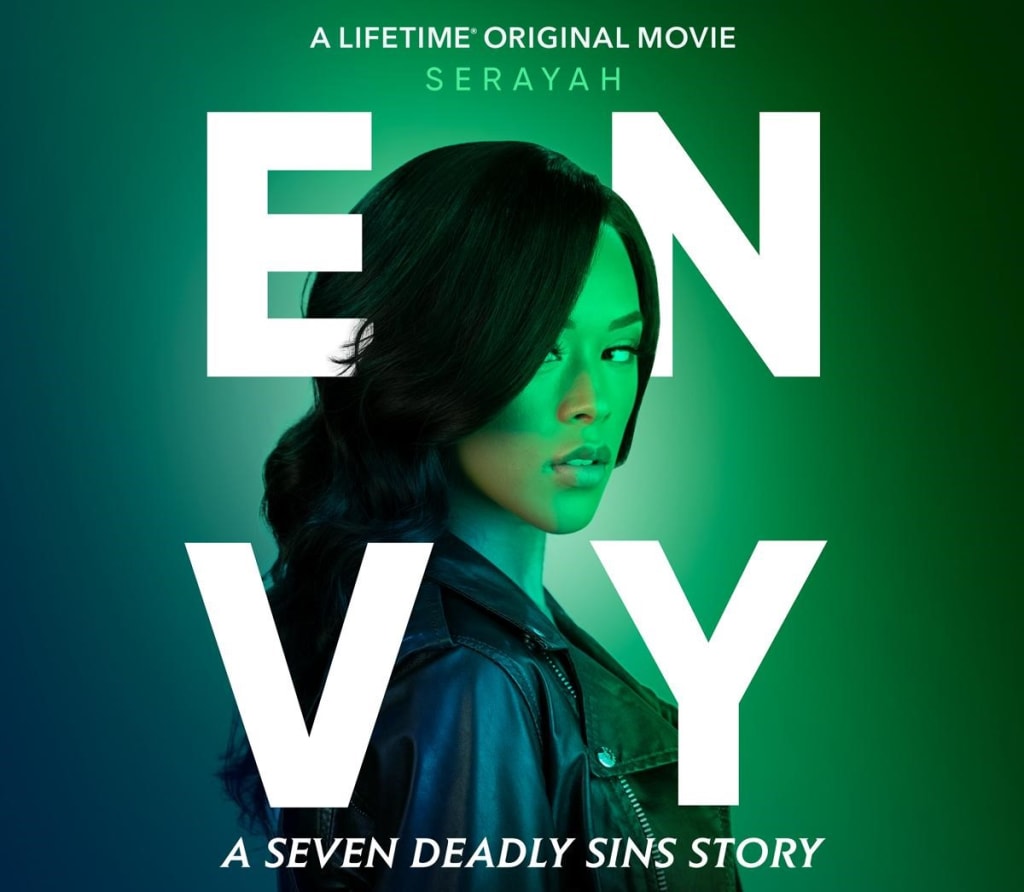Lifetime Review: 'Envy: A Seven Deadly Sins Story'
Serayah shines as a sister scorned in a sequel that improves on areas where its predecessor faltered.

All her life, Keisha Jones (Serayah) has known nothing but struggle. Raised in poverty by her mother Daisy (Jacinte Blankenship), Keisha never knew who her father was growing up. It's only after Daisy's death that Keisha discovers who he is: Daisy's then-married lover Elijah Wilson (Gregory Alan Williams), the recently widowed father of PR agent Gabrielle Flores (Rose Rollins). After learning about Daisy's passing and Keisha being his daughter, a remorseful Elijah meets Keisha and Gabrielle--despite some reservations--invites her half-sister to move in with her for the time being.
But Gabrielle's discomfort over her father's past indiscretions isn't the only thing she'll have to worry about. Because now that Keisha's found her father, she's also seen how her half-sister has all the things she's never had: money, a thriving career, a loving husband, and a beautiful daughter. And now that she's moved in, Keisha is prepared to use all sorts of trickery to have what she's "owed."
On the surface, this second chapter of the Seven Deadly Sins series would sound like a routine "Vengeful Long-Lost Child/Sibling" storyline. It's been seen in plenty of Lifetime movies, such as A Daughter's Plan to Kill and Remember Me, Mommy?. But much like the latter film I just mentioned, Envy mines its premise for all the emotional resonance it has. And in comparison to its predecessor, Envy matches wits with Lust in how their scripts are able to facilitate real character growth. At the same time, though, Envy avoids fumbling the ball in the final act as badly as Lust did and has a steadier plot flow to keep viewers from getting antsy before then. There's still a problem or two to be found, but overall, Envy improves upon where Lust slipped up and makes for a surprisingly moving watch.
Much of the heart Envy has at its core can be credited to Serayah's performance as Keisha. Best known for her role on Empire, Serayah and the script work hand-in-hand to make Keisha Jones a much more complex villain than Lust's Trey Taylor. While Lust seemed to be developing Trey into more than just a vengeful sociopath before doubling back at the last second, Envy's script gives Keisha an arc throughout the movie that allows you to track her progression as a villain. With the opening minutes being devoted to Keisha, we get to see her early life and what set her on her path to seeking vengeance. While it at times seems Keisha is being motivated solely by greed, her backstory and dialogue show that it's more about her wanting the "perfect life" she feels she was robbed of as a child. After growing up with nothing, Keisha resents Gabrielle for having everything--and believes it justified that she takes it all for herself. And as the film goes on, Serayah grants the viewer fleeting glimpses of the broken girl that Keisha tries to hide under a tough exterior.
WARNING: Spoilers Below
Midway through the movie, we get a clearer look at the humane side of Keisha when she briefly abandons her plans. With Keisha's softer side slowly emerging throughout the film's first act, it's believable then that her biological father's kindness and Gabrielle's acceptance would snuff out her desire for revenge. It's only thanks to a few perceived slights (including one where Gabrielle nearly ends up taking credit for a work idea Keisha came up with) that Keisha winds up feeling rejected by her half-sister and rededicates herself to destroying Gabrielle's life. Even then, Keisha's sense of humanity remains, which makes her third-act breakdown especially heartbreaking. By then, it's abundantly clear that Keisha (for all her wicked deeds) isn't a heartless monster. The script and Serayah keep Keisha's journey from villainy to redemption consistent and credible, making the finale where Keisha is forgiven by Elijah and Gabrielle a wholly satisfying--and touching--conclusion.
Spoilers Over
Opposite Serayah, we have Rose Rollins (who bears a striking resemblance to Nia Long) as Gabrielle Flores. When compared to Keisha, Gabrielle is a much less attention-grabbing character. For the most part, her character and the conflicts she goes through aren't anything Lifetime hasn't shown before. It doesn't help that Gabrielle has a mild case of what I call "Revolving Door Likability." While it's understandable that she'd be apprehensive over Keisha, it seems she abruptly bounces between warming up to her sister and completely distrusting her--all this when Keisha hasn't shown many overt signs of treachery to her. Even worse is how Gabrielle comes across as the worst type of workaholic, consistently putting her career ahead of her family while half-heartedly claiming to want to be more present in their lives.
Thankfully, Rose Rollins' likable performance makes up for Gabrielle's unlikable moments; moments that eventually come together to form her and husband Mauricio's arc together as a couple. Much like Tiffanie and Damon from Lust, Gabrielle and Mauricio are realistically written in terms of their relationship dysfunction. While things in the Flores house initially look as idyllic inside as they do outside, you quickly get to see the cracks in the foundation. Mauricio is quick to show his frustration with Gabrielle's work-centric nature, specifically in how frequently it pulls her away from their daughter. Donovan Christie Jr. follows Rollins' lead in bringing sympathetic energy to Mauricio--one that manages to weather out his character's less-than-savory moments.
SPOILER ALERT The hairier of their conflicts lies in Mauricio's disdain for Gabrielle's biggest client/benefactor Justus. We eventually learn that Justus is Gabrielle's ex, and during a time when Mauricio and Gabrielle were broken up, Gabrielle briefly went back to Justus. So on top of his wife working with her former lover, Mauricio fears that Bella might not be his daughter. It's an explosive conflict that gets an equally explosive climax at a red carpet event. While you understand Mauricio's discomfort, it's also hard not to understand why Gabrielle feels she has to keep Justus as a client. After all, her business is largely possible because of him and Justus himself is a complete aversion of all the Toxic Ex tropes. But in the end, Mauricio continues with his "it's your career or me" stance, giving off a possessive vibe that the movie never really addresses. Christie and Rollins still play well off each other and the resolution to their marital strife isn't unrealistically breezy like Tiffanie and Damon's, but it's a rushed resolution all the same. Spoilers Over
The supporting cast is just as strong as the main players, with characters that come with less problematic baggage. Gregory Alan Williams is instantly lovable as Gabrielle and Keisha's big-hearted father Elijah, who spends the entire film intent on making amends to Keisha for unknowingly abandoning her. Kandi Burruss brings all the necessary sass to Gabrielle's Genre Savvy best friend Regan Givens, while Da Brat is clearly having a ball playing over-the-top gossip queen Veda Laurelton. Avangeline Friedlander is adorable in her debut role as young Bella Flores, sharing her best chemistry with Serayah as Keisha begins bonding with her newfound niece. Hosea Chanchez is effectively charismatic as celebrity rapper Justus and, while his character abruptly disappears by the second act, D.C. Young Fly makes an impression as Keisha's goofy and more overtly nasty cohort Buck. We also see a return of Clifton Powell's Pastor Cooper, giving the same memorable pastoral delivery that he gave in Lust and providing a bit of Seven Deadly Sins universe building alongside Justus (whose name popped up a few times in Lust).
While Envy has some of the same problems as Lust, it avoids just as many and alleviates the ones it does replicate. With smoother pacing and a somewhat better handling of the troubled couple at its center, Envy clears the bar set by the first installment of the Seven Deadly Sins saga. Serayah deserves a great deal of credit for her excellent portrayal of a well-written villainess, with the rest of the cast joining her in bringing the script's emotional fiber to life. It's still shaky in places, but by all accounts, Envy is a step in the right direction for Seven Deadly Sins.
Score: 7.5 out of 10 mall directories.
About the Creator
Trevor Wells
Aspiring writer and film lover: Lifetime, Hallmark, indie, and anything else that strikes my interest. He/him.
Twitter: @TrevorWells98
Instagram: @trevorwells_16
Email: [email protected]






Comments
There are no comments for this story
Be the first to respond and start the conversation.